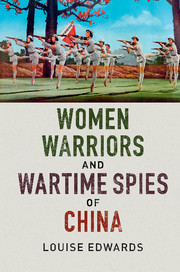Book contents
- Frontmatter
- Dedication
- Contents
- List of Figures
- Acknowledgements
- Chronology
- 1 Soldiering, war and gender in China
- 2 The archetypal woman warrior, Hua Mulan: Militarising filial piety
- 3 Qiu Jin: Transitioning from traditional swordswoman to feminist warrior
- 4 Xie Bingying opening public spaces to women Fighting patriarchy and fighting militarists
- 5 Aisin Gioro Xianyu: ‘Joan of Arc of the Orient’ or ‘Mata Hari of the East’?
- 6 Guerrilla resistance leader, Zhao Yiman: Warrior teacher and self-sacrificing CCP mother
- 7 Negotiating sexual virtue: The glamorous, honey-trap spy, Zheng Pingru
- 8 Ding Ling and Zhenzhen: Female chastity and good communist governance
- 9 Mobilising and militarising rural China through the girl martyr, Liu Hulan
- 10 Women warriors and wartime spies as tools for ‘total militarisation’: The Red Detachment of Women
- Notes
- Bibliography
- Index
4 - Xie Bingying opening public spaces to women Fighting patriarchy and fighting militarists
Published online by Cambridge University Press: 05 March 2016
- Frontmatter
- Dedication
- Contents
- List of Figures
- Acknowledgements
- Chronology
- 1 Soldiering, war and gender in China
- 2 The archetypal woman warrior, Hua Mulan: Militarising filial piety
- 3 Qiu Jin: Transitioning from traditional swordswoman to feminist warrior
- 4 Xie Bingying opening public spaces to women Fighting patriarchy and fighting militarists
- 5 Aisin Gioro Xianyu: ‘Joan of Arc of the Orient’ or ‘Mata Hari of the East’?
- 6 Guerrilla resistance leader, Zhao Yiman: Warrior teacher and self-sacrificing CCP mother
- 7 Negotiating sexual virtue: The glamorous, honey-trap spy, Zheng Pingru
- 8 Ding Ling and Zhenzhen: Female chastity and good communist governance
- 9 Mobilising and militarising rural China through the girl martyr, Liu Hulan
- 10 Women warriors and wartime spies as tools for ‘total militarisation’: The Red Detachment of Women
- Notes
- Bibliography
- Index
Summary
Born a year before Qiu Jin's execution, Xie Bingying (1906–2000) lived in a fashion that Qiu Jin had struggled to make possible for other Chinese women. During her long life, only six years short of a century, Xie Bingying secured for herself a school-based education, trained and fought in the military, wrote and published creative works, polemical articles and autobiographies and maintained her commitment to fighting for China's independence from foreign control and freedom from internal chaos. Bingying demonstrated that women could achieve both literary (wen) and martial attributes (wu) – qualities, when found together, were traditionally the twin preserves of men in their performance of ideal masculinity. The matchmaker who negotiated her first marriage declared in a ‘premature triumph’ to her new mother-in-law: ‘Not only is she perfect in both literary and martial skills, she can handle every household chore.’ Xie Bingying escaped this arranged marriage and secured a divorce to make a love match and an independent life. Her publicly recognised exercise of both literary and martial talents was sustained over decades as she worked at the front lines of battle in three major military events – the 1926–1928 Northern Expedition in which Nationalist and Communist troops joined forces to crush the disparate warlords and unify the nation under one rule, the 1932 Shanghai Incident to repel Japanese attacks on that city and the full-scale Japanese invasion of China in 1937.
Xie Bingying is one of modern China's most remarkable women – a fighter for women's freedom from patriarchy and for China's freedom from chaos and foreign occupation. Her story shows us that the singular position Qiu Jin had created, as a feminist anti-Qing warrior, had by the 1920s become a more common phenomenon. In Xie Bingying's generation, women's participation in the military was an organised, group activity, not a lone act of a knight errant. Their patriotism was directed at unifying their republic, rather than overthrowing a monarchy, and this republic was one in which men and women would be equal partners. Bingying and her comrades-in-arms aimed to overthrow men's dominance of women through their participation in expelling militaristic aggression from China's territory.
- Type
- Chapter
- Information
- Women Warriors and Wartime Spies of China , pp. 66 - 90Publisher: Cambridge University PressPrint publication year: 2016



